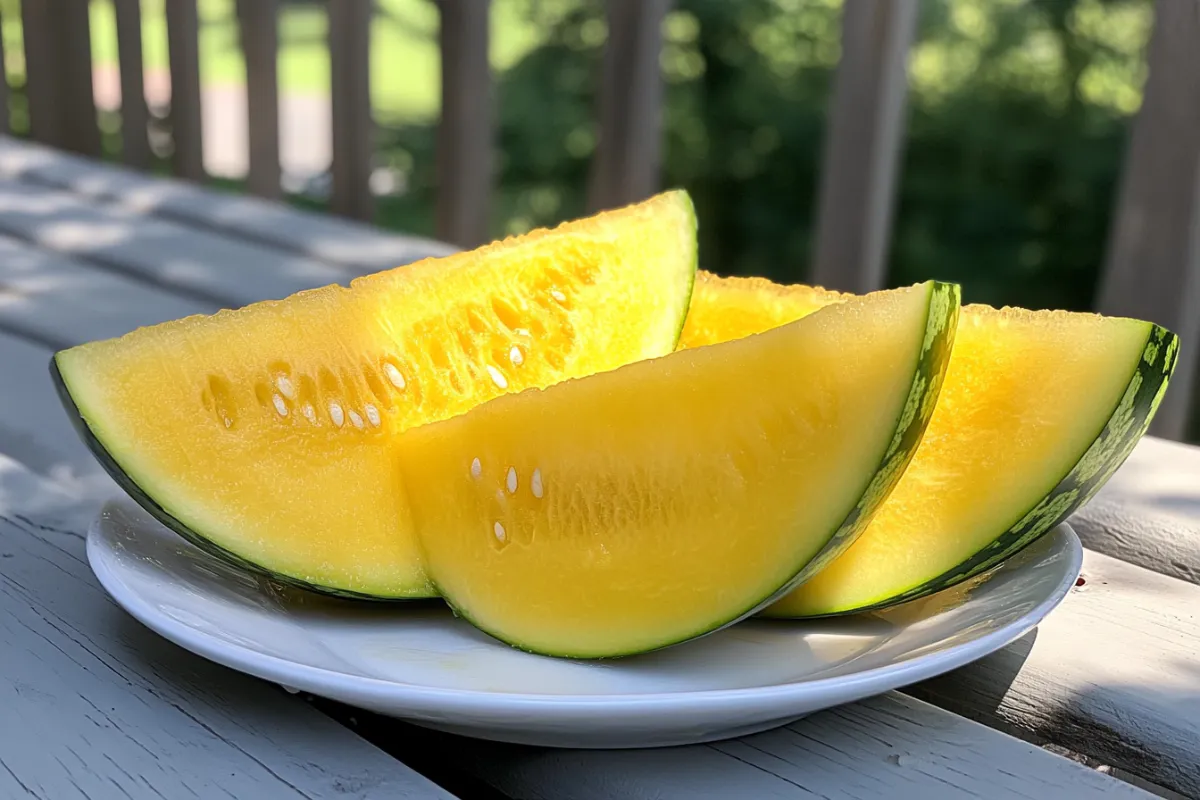Is Yellow Watermelon as Healthy as Red? A Complete Comparison
Watermelons are one of the most refreshing fruits enjoyed around the world, and while most people are familiar with the red variety, the lesser-known yellow watermelon is also growing in popularity. With a vibrant yellow interior and a slightly sweeter taste, yellow watermelon is often a subject of curiosity. But one of the biggest questions people have is whether yellow watermelon is as healthy as red watermelon. In this article, we’ll dive deep into the nutritional comparisons, health benefits, and frequently asked questions to provide a comprehensive guide.
What is Yellow Watermelon?
Yellow watermelon is a variety of watermelon that naturally lacks lycopene, the antioxidant responsible for the red color in most watermelons. Instead, it is rich in beta-carotene, the pigment that gives carrots and sweet potatoes their vibrant orange and yellow hues. Despite these differences, yellow watermelon is just as natural as red watermelon and has been cultivated for centuries.
Both red and yellow watermelon varieties belong to the Citrullus lanatus species, meaning they share a similar genetic background, but with key differences in pigmentation. Interestingly, yellow watermelon tends to be a bit sweeter and has a honey-like flavor.
To learn more about the origins of yellow watermelon and how it differs from the common red variety, check out All You Need to Know About Yellow Watermelon.
Nutritional Content: Yellow vs. Red Watermelon
Both yellow and red watermelons have a high water content, making them excellent choices for hydration, especially during summer. However, when it comes to nutritional content, there are some differences worth noting.
1. Vitamins and Minerals
- Yellow Watermelon: Rich in beta-carotene (which converts to vitamin A), vitamin C, and lutein.
- Red Watermelon: Contains lycopene, which is linked to heart health and cancer prevention, along with vitamins A and C.
Both varieties are low in calories and fat-free, making them ideal for a healthy snack. They also contain potassium, which helps in regulating blood pressure and maintaining fluid balance in the body.
Antioxidant Properties
Antioxidants are crucial for protecting the body from oxidative stress, which can damage cells and lead to chronic diseases. Both types of watermelon have significant antioxidant content, but they differ in the types of antioxidants they offer.
2. Lycopene in Red Watermelon
- Lycopene is a powerful antioxidant that has been linked to a reduced risk of heart disease and certain cancers. It is responsible for the deep red color in watermelon and tomatoes.
- Studies show that consuming foods rich in lycopene may improve cardiovascular health and reduce the risk of prostate cancer.
3. Beta-Carotene in Yellow Watermelon
- Beta-carotene, present in yellow watermelon, is another potent antioxidant that supports eye health and boosts the immune system. This antioxidant is converted into vitamin A, which is essential for maintaining healthy skin and vision.
- Yellow watermelon also contains lutein, which further supports eye health by protecting against macular degeneration.
If you’re interested in exploring more about the health benefits of yellow watermelon, check out Yellow Watermelon vs. Red Watermelon: Uncovering Nutritional Treasures.
Health Benefits of Yellow Watermelon
Yellow watermelon, thanks to its high beta-carotene and vitamin C content, offers several health benefits:
- Improves Eye Health: Beta-carotene and lutein in yellow watermelon help protect against age-related macular degeneration and improve overall vision.
- Boosts Immunity: Vitamin C is essential for a strong immune system, helping your body fight off infections and illnesses.
- Promotes Hydration: With over 90% water content, yellow watermelon is a fantastic fruit for staying hydrated, especially in hot climates.
- Supports Skin Health: Vitamin A and C promote the production of collagen, which helps maintain skin elasticity and prevents premature aging.
Health Benefits of Red Watermelon
Red watermelon is equally impressive when it comes to health benefits:
- Heart Health: Lycopene has been linked to improved heart health by lowering cholesterol levels and reducing inflammation in the arteries.
- Cancer Prevention: Regular consumption of lycopene-rich foods may lower the risk of certain types of cancers, especially prostate cancer.
- Hydration: Like yellow watermelon, red watermelon is rich in water and helps maintain proper hydration levels in the body.
- Skin Protection: Lycopene also acts as a natural sunscreen, protecting your skin from harmful UV rays.
Comparing Taste and Culinary Uses
One of the most notable differences between red and yellow watermelon is their taste:
- Yellow Watermelon: Known for its sweeter, honey-like flavor, yellow watermelon is perfect for summer salads, smoothies, and desserts.
- Red Watermelon: Crisp and refreshing, red watermelon is often used in juices, fruit platters, and traditional watermelon dishes.
Both varieties are versatile and can be used interchangeably in recipes, but their distinct flavors offer unique culinary experiences.
Which is Healthier: Yellow or Red Watermelon?
When it comes to choosing between yellow and red watermelon, it largely depends on your health goals:
- For Eye Health: Yellow watermelon is the better choice due to its high beta-carotene and lutein content, which are known to support vision.
- For Heart Health: Red watermelon takes the lead with its lycopene content, which is excellent for maintaining cardiovascular health.
- For General Antioxidant Benefits: Both varieties are great choices, as they are rich in antioxidants that help fight free radicals and reduce the risk of chronic diseases.
Ultimately, both yellow and red watermelon are nutritious and offer different health benefits. Including both in your diet can provide a well-rounded intake of essential vitamins and antioxidants.
Yellow vs. Red Watermelon for Weight Loss
Watermelons are naturally low in calories and fat-free, making them ideal for weight loss. Both varieties provide the following benefits:
- Low-Calorie Snack: With only about 46 calories per cup, both yellow and red watermelon are great for satisfying sweet cravings without adding extra calories.
- Hydration: Staying hydrated is key to effective weight loss, and watermelons’ high water content helps keep you full and hydrated.
- Natural Diuretic: Watermelons act as a natural diuretic, helping to flush out excess water and toxins from the body, which is beneficial for reducing bloating and improving digestion.
FAQs
1. Is yellow watermelon more nutritious than red watermelon?
Yellow watermelon is rich in beta-carotene, while red watermelon contains lycopene. Both are highly nutritious and offer different health benefits.
2. Can yellow watermelon replace red watermelon in my diet?
Yes, you can substitute yellow watermelon for red watermelon in any recipe or meal plan. Both have similar textures and water content.
3. Is it safe to eat watermelon every day?
Yes, watermelon is a healthy fruit that can be consumed daily, provided it is eaten in moderation.
4. How can I tell if a watermelon is yellow or red before cutting it?
Unfortunately, you cannot tell from the outside whether a watermelon is yellow or red. Always check labels or ask your seller for confirmation.
5. Are there any side effects to eating too much watermelon?
Eating too much watermelon can lead to digestive discomfort, such as bloating or gas, due to its high water content. Moderation is key.
Conclusion
So, is yellow watermelon as healthy as red? The answer is yes. Both yellow and red watermelon offer unique health benefits, from eye health to heart protection, and are packed with antioxidants, vitamins, and minerals. Whether you prefer the sweeter, honey-like flavor of yellow watermelon or the crisp, refreshing taste of red watermelon, both are excellent additions to a balanced diet.
By incorporating both varieties, you can enjoy a wide range of health benefits, ensuring you stay hydrated, nourished, and full of energy. With their vibrant colors and delicious flavors, yellow and red watermelon are the perfect fruits to enjoy all year round.
For more information on yellow watermelon, check out our Ultimate Guide to Yellow Watermelon Nutritional Benefits.

